
Agro-tourism, also known as agritourism, is an innovative form of tourism that combines agriculture and recreation. It offers visitors an authentic experience of farm life, allowing them to immerse themselves in rural activities while learning about sustainable farming practices. Agro-tourism has gained popularity in recent years as more people seek unique and environmentally conscious travel experiences.
Benefits of Agro-Tourism
Agro-tourism provides several benefits for both farmers and visitors. For farmers, it serves as an additional source of income, especially during off-seasons. It helps them diversify their revenue streams while promoting their products and practices. For visitors, it offers a refreshing escape from urban life, reconnecting them with nature and agricultural heritage.
In addition, agro-tourism helps foster a deeper understanding of the food production process and encourages support for local farmers. Visitors often develop a newfound appreciation for the hard work that goes into growing food, which can inspire more conscious consumption habits.
Activities in Agro-Tourism
Agro-tourism offers a wide range of activities that vary depending on the location, type of farm, and season. Common activities include farm tours, where visitors can explore the fields, orchards, or vineyards. Some farms offer hands-on experiences, such as picking fruits or vegetables, milking cows, or feeding livestock.
Other popular activities include hayrides, fishing, and hiking through scenic farmland. Many farms also host workshops on sustainable farming, beekeeping, cheese-making, or wine production. These activities allow tourists to engage directly with the land and its produce, enhancing their connection to nature and rural life.
The Rise of Farm Stays
Farm stays have emerged as a key component of agro-tourism, offering visitors the chance to stay on working farms. Farm stays provide a more immersive experience, as guests can live among farmers and participate in daily farm activities. This allows visitors to gain firsthand insight into rural lifestyles, farming practices, and agricultural challenges.
Farm stays range from basic accommodations to more luxurious setups, depending on the farm and its facilities. Some farms offer rustic cabins or cottages, while others may have guesthouses equipped with modern amenities. Regardless of the accommodation style, farm stays typically emphasize simple, wholesome living that reflects the rhythms of farm life.
Educational Value of Agro-Tourism and Farm Stays
Agro-tourism and farm stays have an inherent educational aspect. Visitors, especially children and families, can learn about the environment, organic farming, and sustainable living. Many farms offer educational programs that cover topics such as crop rotation, composting, water conservation, and biodiversity.
These educational opportunities extend beyond the farm itself. Local communities often collaborate with farmers to organize eco-friendly tours, local food tastings, and cultural activities. This fosters a deeper connection between tourists and rural areas, promoting environmental awareness and responsible tourism.
The Impact of Agro-Tourism on Rural Communities
Agro-tourism can have a positive economic and social impact on rural communities. It brings tourists to areas that may not typically attract visitors, which helps boost the local economy. Tourists often spend money on local products, crafts, and services, benefiting small businesses and creating job opportunities in the community.
In addition to economic benefits, agro-tourism encourages the preservation of rural traditions and agricultural heritage. By showcasing traditional farming methods and celebrating local culture, agro-tourism helps protect and promote the unique identities of rural regions.
Sustainable Tourism and Agro-Tourism
Sustainability is a key focus of agro-tourism, as it aligns with the principles of eco-friendly travel and conservation. Many farms that participate in agro-tourism emphasize sustainable agricultural practices, such as organic farming, permaculture, and regenerative agriculture. This focus on sustainability attracts tourists who are mindful of their environmental impact and interested in supporting eco-conscious businesses.
In addition to sustainable farming, agro-tourism also promotes eco-friendly accommodations and activities. Many farm stays are designed to minimize environmental footprints by using renewable energy sources, recycling waste, and conserving water. Sustainable agro-tourism can play a role in promoting environmentally responsible tourism practices.
Challenges Facing Agro-Tourism and Farm Stays
Despite its growing popularity, agro-tourism faces several challenges. One of the main challenges is balancing tourism activities with the demands of running a farm. Farmers must ensure that their tourism ventures do not interfere with their primary agricultural operations, which can be time-consuming and labor-intensive.
Another challenge is managing visitor expectations. Some tourists may arrive with romanticized ideas of farm life, only to realize that it involves hard work and unpredictability. Additionally, weather conditions, seasonal changes, and the unpredictability of farming can impact the tourist experience.
The Future of Agro-Tourism
The future of agro-tourism looks promising as interest in sustainable travel and authentic experiences continues to grow. Agro-tourism can play a significant role in educating people about the importance of food security, environmental conservation, and supporting local farmers.